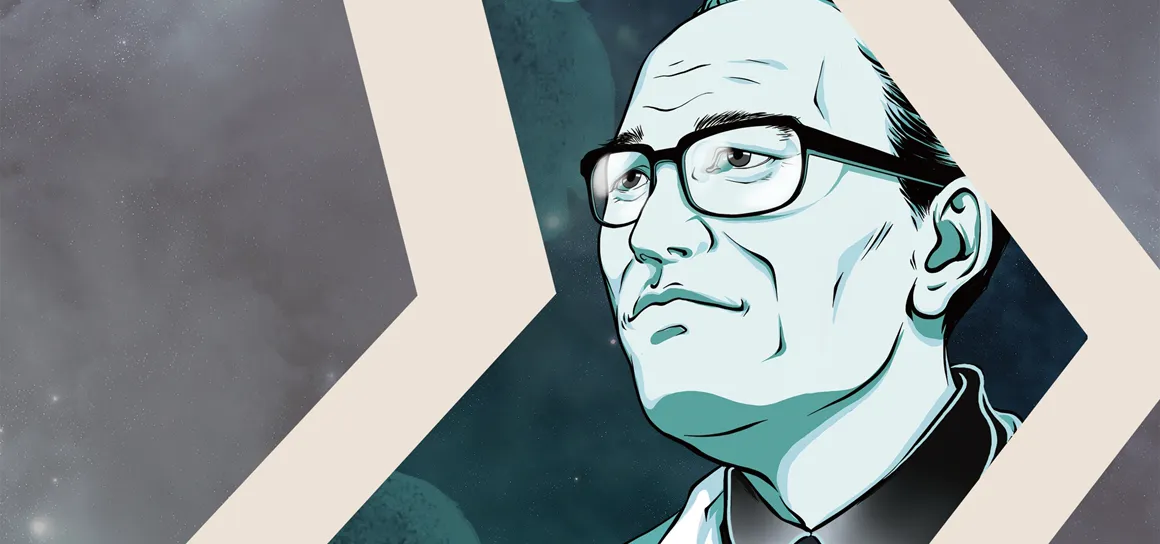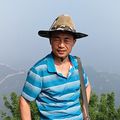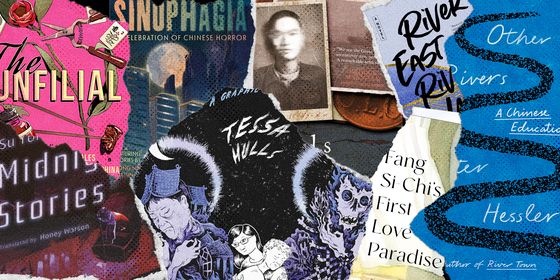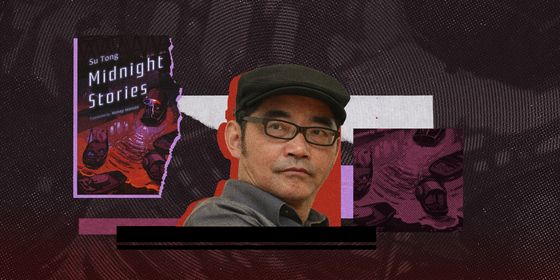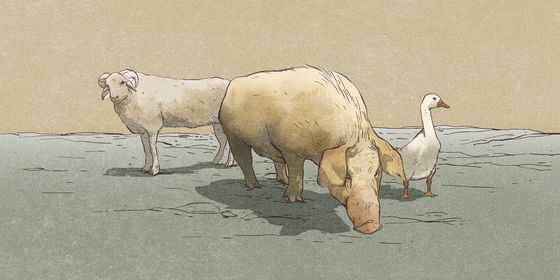“Serve the people” was his mantra—but the venerable professor was about to learn a real-life lesson from outside his ivory tower
The professor was just over 60, and on his sagely skull only a bit of wispy hair was left, like smoke curling from his head. A very plain pair of spectacles rested on his frail nose. The eyes behind their lenses were calm and meticulous. He was short, and wore a white, full-length lab coat year round. To anyone who looked at him, one word came reflexively to mind—scholar.
The professor was an authority in animal husbandry and had published papers in both China and abroad, which gained a lot of attention. Several foreign universities had offered him professorships, with high salaries, all of which he politely declined. Fame and wealth never entered his consideration. In his study, a large plaque hung with the short sentence “To serve the people,” the calligraphy by Chairman Mao. These words were his lifelong belief; even though he’d also suffered as a “scholar-tyrant” during the Cultural Revolution, even as many people threw out this slogan and the revolution with the dredges of history, he believed it still more firmly. He believed in living an honorable life, conducting oneself in ways worthy of one’s conscience and the judgment of history—save for one incident, where things could have gone two ways.
It was a summer 10 years ago, when the professor learned that in Liudaowan village, on the outskirts of the city, there was a cow suspected of having foot-and-mouth disease. He’d hurried to investigate, and the results showed, sadly, that all six of the farmer’s cows were infected. He knew that if it were to spread, the disease could threaten the livestock of the entire province, so he organized a team to inspect the village; thankfully, it was just the one household.
That honest farmer stood trembling next to the professor, a carton of cigarettes in his hand, not knowing what to do. His plaintive gaze flitted between the professor and the investigators.
“Slaughter, and bury deep.” The professor spoke resolutely.
The farmer was paralyzed with shock, as if the death sentence had been handed out for him rather than the six milk cows which were all his family’s assets. He knelt beside the pen, crying bitterly. The professor felt terrible, and could only look away, saying nothing even as his team entered the pen with sledgehammers in hand.
The cows ceased moving a short while after they fell to the ground. The corpses were taken to the Gobi Desert and thrown into a two-meter deep pit, covered with fuel, and incinerated. The smell of burning flesh and hide was acrid.
Back at the university, the professor wrote a paper on the dangers, symptoms, and prevention methods of diseases like these. The paper got significant attention from government officials, and a series of policies established, with infected animals to be put down at the first sign of symptoms. The professor was given the title of “Excellent Worker in Science and Technology” that year.
A year later, passing by Liudaowan village, the professor thought to visit the farmer to give him some assistance. He opened the door but saw a strange man, who told him: The farmer hadn’t gotten his compensation for the slaughtered cattle—1,000 RMB per cow—and hanged himself in the lime-covered cow pen three months ago. His wife sold the house and took their two little children back to her hometown. Hearing this, the professor had trouble breathing, and felt a pain in his chest.
From that time on, the professor would frequently have such episodes with his chest, and was diagnosed with heart disease. Even though he was an atheist, he thought that it was heaven’s punishment, for he’d ruined and killed that family.
Afterwards, the professor was more watchful with his words and actions, and maintained caution when dealing with the government.
At noon one day, as the professor watched Society Overview on television at home, the phone rang: The university wanted him to look into the situation of the livestock industry in southern Xinjiang. After some hesitation, he agreed. These “investigations” were generally like vacations, which couldn’t hurt anyone. Moreover, when he was younger he’d been sent to southern Xinjiang for “re-education” for a few years, and wanted to go back and take a look, maybe contribute some advice for economic development there. The professor set up some work at the lab for his favorite student, who would also be his last-ever graduate student, and then headed out.
***
The new SUV bounced as it drove over the dirt road, kicking up a trail of dust behind. The vast Gobi Desert outside the window seemed boundless. They arrived at the first county in the mid-afternoon; two local leaders were waiting, and welcomed them with dinner according to custom. By next morning, the day’s itinerary was already planned: First, they’d go to the county’s best goat-breeding base, then to the main bazaar to enjoy local culture and delicacies. They’d get back for a nap at noon, and tour a Tang dynasty ruin in the afternoon.
Two days later, they went to another village, where they did much of the same “work.” The professor, accustomed to being busy, felt happy, relaxed, and bored at the same time. Half a month slipped by, until they arrived at the last county.
By the last evening, the professor was again the only one left on his feet—on account of his age and renown, those binge-drinkers were too embarrassed to tip their glass at him. Thinking the trip was almost over, he was both happy and sad. Looking at his watch, he estimated there were a few hours of daylight left, so he took a walk to the river outside the village.
The river flowed languidly, and the light of the setting sun sparkled on the soft ripples of the surface. The professor cupped his hands to the water and rinsed his mouth. It left an earthen taste, but was nicer than the taste of meat and liquor. Ephedra sinica grew upon the banks of the river. This was a perennial herbaceous shrub, its leaves long ago evolved to grow into thin stalks with three leaves to persist in dry environments. These characteristics made it able to withstand alkaline soil and grow in desert areas.
An old Uyghur man in a white hat drove a flock of goats down the riverbank; his silvery beard shone under his chin. The professor greeted him in Uyghur, and the two started to converse. The old man told him that almost every family in the village raised goats, but the odd thing was, the mother goats would frequently miscarry. The professor asked him what they fed the goats in winter. The old man said that they grazed outside in the day, and at night were ate corn and cottonseed husks.
The professor realized that he’d found something after all on the tour.
Back at the university, the professor turned his conversation with the Uyghur man into a paper, titled “On Miscarriages in Goats”. In it, he wrote: “E. sinica contains ephedrine, which can result in sweating, diuresis, alleviation of asthma, and contractions of the leiomyosarcoma in the womb. Pregnant livestock that consume large amounts of the plant can experience miscarriage…”
The professor gave a fair copy of the paper to his graduate student, who pointed out two unclear areas and added content. Although the student had politely declined, the professor still added his name to the paper. Helping along talented students was, he felt, an obligation.
In 30 years of teaching, he’d never seen a student who could compare with this one. The boy was supremely talented, with superior ability to take in information as well as innovate. The professor thought this child could one day surpass his own achievements, which was the reason he’d agreed to take on one final advisee the previous year.
Two months later, a student who’d graduated five years previously came to visit the professor. This one had never had very good grades, but had great people skills, served on the student council, and was now the head of a company that made veterinary drugs. He said that he was greatly inspired after reading the professor’s paper, and had decided to invest in an ephedrine-processing plant in that county. Not only would it put local plant life to use, but it could also bring another source of income to the locals.
The professor thought this was a good deed to benefit the people and country, and agreed to be an honorary consultant. A few months later, the former student came by again with a local official, saying that the province’s first ephedrine-processing facility was to open in a week, and they wanted the professor to participate in the ribbon-cutting, to which he agreed.
Standing at the gate of the facility, a few primitive warehouses towering behind him, he faced a large group of workers who had been roped in to attend. The professor felt very awkward standing there in his suit and leather shoes. His student happily introduced the VIPs, who all had long strings of overly flattering titles in front of their names, which made him ashamed to hear. A large ribbon tied into a red rosette was brought by the young hostesses, and the guests, shears in hand, prepared to cut it.
Snip! Snip!—sounded the shears. The professor panicked a short beat and then cut the ribbon. Applause and firecrackers rang out over the lonely wasteland.
At noon, the head of the company took the guests to a private room in the workers’ canteen, and invited the professor to sit as guest of honor. In this not very luxurious—even quite plain—room, all kinds of delicacies unavailable in the city were laid upon the table: Mongolian gazelle, pheasant, hedgehog, turtledove, and a few even the head of the company couldn’t name. The professor couldn’t bear to try these exotic meats, but the others ate with gusto, commenting on their deliciousness.
After the meal, the head invited him into his office for tea; the opulence of the fittings shocked him. He couldn’t imagine how, just a few years after graduation, this student had created so much social value and amassed such wealth. The topic of conversation quickly turned to the company’s activities. The professor spoke earnestly: “If you have any questions about the technical aspects, do call me, and I’ll help you. However, I want to remind you, ephedrine can be a drug. If you don’t manage your distribution channels well, it can bring harm to society. I said before, when teaching you all, no matter if one’s ability is great or small, one should work to benefit society.”
The former student nodded in agreement, but inwardly laughed at these outmoded ideals.
After a break, the company head took the professor to see the production room and the storehouse. It was a walled open-air court, the size of two football pitches. Large characters on the wall read “No Naked Flames” and “Diligence Creates Wealth.” Pile after pile of ephedra plants were heaped on the floor like sand dunes. The plant that had evolved to survive in this harshest of environments had been ripped up by the roots.
The company head spoke proudly: “I buy these ephedra plants for half a yuan per kilo, and some villagers can dig up a hundred kilos a day. It’s alleviating poverty…”
The professor felt regret hearing his former student boasting like this. He returned to the river, and saw that all traces of green were gone, leaving the landscape like a camel hide shorn of hair. He felt a pain in his heart, and remorse for what he’d done to these people’s village. Already there’d been hardly any vegetative cover in this wasteland, and the few ephedra that had managed to grow were now destroyed by people. Although the villagers would be happy with some money in their pockets for a while, it wasn’t worth the ecological price they’d pay. What angered him most was that the architect of this destruction was a former student of his—and that he’d gone to participate in the ribbon-cutting! The professor felt he was an accessory to the crime, and his paper was the bait that’d attracted the wolves.
Perhaps old age had led him to tend towards introspection. Winter came, and he thought of these things every night. He became weaker and weaker, increasingly in low spirits, like grass that had frosted over. Every time he went to the lab, his student told him to go home and rest, and leave the work to him. The professor was happy to hear these thoughtful words, thinking that his studies and achievements would have a successor, and was slightly comforted.
Three months later, the professor heard the ephedra-processing plant had been ordered to cease production on account of illegal sales. Regretful, yet happy, he exclaimed: “That’s karma!”
He remembered that his student hadn’t been to see him in a month—that kid, so engrossed in experiments that he’d forgotten everything else. Since the professor’s wife wasn’t home, he bundled up and made his way to the lab. The door was locked. When he opened it, he saw there was a layer of dust on the desk, and all the instruments were gone. As he stood there wondering what had happened, the security guard came up and spoke to him. “Professor, are you feeling better? Don’t feel too bad. Your student, he looked like such a decent guy. Who’d have guessed he’d do such a thing?”
“What happened?” the professor asked, anxious.
“He was using this thing called ‘ephedrine’ to manufacture drugs. The police came by and busted him last month; he was making it in this lab…”
The professor felt a pain in his chest and passed out.
When he came to life, he was lying in the hospital, and as he started thinking, tears welled up in his eyes, flowing over the wrinkles upon his face. His wife sat at his side, crying herself, as she wiped the tears from his eyes. “My dear, you shouldn’t worry. I actually found out long ago but was worried how it would affect you. Why would you go to the lab yourself…?”
The professor composed himself as his wife continued to cry. He grasped her hand and spoke to her: “Using knowledge to break the law is evil. For a crime like this he should go to prison, be executed!”
The professor gritted his teeth as he cursed his student, but in his heart he felt great sadness, not for his student, but for himself. He’d worked his whole life as an educator, yet he’d raised a sneaky meth cook—it was the ultimate humiliation.
“Dad, this isn’t your fault,” said his son. “Ephedrine can be a medicine, and it can be a drug; it all depends on the user. It has nothing to do with you.” Others said the same when they came to visit him, and he gained some comfort, but still felt the pain in the quiet of the night. He stayed in the hospital for a week, and the doctors fussed over him as he was released. His son took him home, then went to his job at a fast food restaurant.
Although the professor was already pushing 62, due to circumstances and his own reasons, he didn’t marry and have a son until he was 40. His son was now a third-year student at an engineering college, and would graduate in just six months. The college was close to their home, but the professor had been deeply influenced by the proletarian revolutionaries of the previous generation and taught his son that he must work hard. He could only come home twice a month, and each vacation he had to work at least half a month outside of home, whether or not the work was paid, because only those who know how hard life is are be motivated to work hard.
His son did, in fact, work hard. The director of the college was one of the professor’s old friends, and would continually praise the son when he talked to the professor, talking about how talented he was, how he excelled at impromptu speaking, how easily he’d become head of the student council. Whenever the director would praise the son, the professor would say, “This is too much, too much,” although he was actually ecstatic.
***
This afternoon, the weather was especially good. The snow upon the windowsill reflected the bright sunlight and the room was warm. His wife went out to buy vegetables. The professor watered the plants, feeling refreshed and energetic. He turned on the TV and quickly found Society Overview, which his wife had forbidden him to watch.
Last month, a graduate student at a top university in the city was arrested for using ephedrine to manufacture drugs and sentenced to death. The criminal has appealed the sentence, and we continue to track developments…
The professor’s heart tightened, and he involuntarily stood up from the couch.
According to information provided by the criminal, many drug dealers and abusers have now been arrested. This morning, the city’s anti-drug brigade apprehended a new batch of dealers. Most of them are young, one special person among them—not an unemployed youth nor a drug dealer, but a university student.
The scene changed, and the host continued speaking: He’s 21 this year, a student at an institute in the city. What could have motivated such a person at the height of his youth to lose his way?
The professor saw clearly—although the top half of the face had been blurred out, the mole on the chin couldn’t have been more familiar to him. He groaned painfully, and fell back to the couch, hand upon his chest. After a short, intense spasm, his body ceased moving.
Author’s Note: This story was first written in 2002, but I only finished and began to revise it recently. I was inspired by one of my professors’ real-life experiences, which is the beginning of the story. I then used my imagination for the rest, to show that bad incidents are usually followed by worse ones.

Xiren (夕人)
Born in 1979, Xiren says that he has switched jobs so many times that civil servant and male escort are the only two professions he hasn’t tried. Xiren’s urge to write derives from “life’s pain,” and he writes for self-consolation. On Douban Read, China’s leading digital publishing platform, he has published one novel in installments and seven other works of fiction, in genres ranging from fables to suspense to fantasy to recent history.
Death of A Professor | Fiction is a story from our issue, “Fast Forward.” To read the entire issue, become a subscriber and receive the full magazine.





